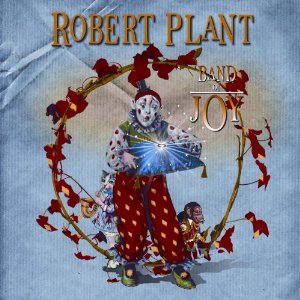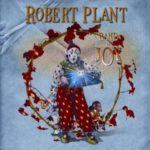
Esparanza/Rounder
While millions of Led Zeppelin fans around the world weep and shake their fists in fury that Robert Plant won’t give in to an inevitable reunion tour, you have to give him a large amount of respect for ignoring the easy way out and the lucrative cash payout, which would surpass the gross national product of a number of countries. Instead, he said his goodbyes to Jimmy Page, John Paul Jones and Jason Bonham following their high profile and much bootlegged O2 Arena gig in 2007 and returned to his own interests. At that time it was working with Alison Krauss and completing the journey of the multiple Grammy-winning Raising Sand album and tour.
Of course, those days on the road did influence Plant towards one creative endeavor. When additional sessions with Krauss weren’t working out, he enlisted guitarist Buddy Miller from that period to collaborate on what’s become his ninth solo release, Band of Joy. The title purposely refers to his pre-Zep days in an outfit that included drummer John Bonham. It was also a group that revised other songwriters’ material. And that’s one of the major components on Band of Joy. The album tackles material by Townes Van Zant, Richard Thompson, Low and some traditional fare. It begins with a cover of Los Lobos’ “Angel Dance” and you immediately catch where Plant is going this time around. It contains an atmosphere of mystery amidst a rumbling instrumental background that melds elements of blues, folk and early rock. He throws a twist in the proceedings by adding a Middle Eastern flair to the chorus.
The mood on Band of Joy is one that’s quickly embraced because it bears a musical ancestry to tracks such as “Rich Woman” and “Please Read the Letter,” ones that he recorded with Krauss on Raising Sand. Bringing in Patty Griffin to add vocals on numbers such as the haunting “Silver Rider” and the Honeydrippers-esque “You Can’t Buy My Love” can’t help but elicit memories of that pairing but Plant isn’t in the mood to merely follow his own footsteps. If that was the case…see the beginning of this review for that answer. Instead, he’s found a pleasurable balance that befits rock royalty aging gracefully. The 12 tracks do not ask him to relive his leonine days fronting Zeppelin nor do they force him to redo some bygone era’s hits collection. And it’s pretty damn obvious that he’s having a good time punching the clock here – “Central Two-O-Nine” evokes the acoustic leaning of Zep’s III while it would be just as comfortably sung by a number of today’s bluegrass or country artists, “Falling in Love Again” hints at a gospel influence that runs deeper on “Satan Your Kingdom Must Come Down,” and “The Only Sound That Matters” takes its melodic cues from Dylan’s “It’s All Over Now, Baby Blue.”
Plant found equal artistic success eight years ago on the psychedelic terrain of Dreamland. A possible preview of what’s in store for the future comes in the form of the loose mash up of hip-hop, rock and sonic textures on “Even This Shall Pass Away,” which echoes some of his past musical experimentation. Still, it could be just another momentary detour because overall, here, Plant’s roots are showing and its slow boil makes for some mesmerizing cross-cultural results.



No Comments comments associated with this post